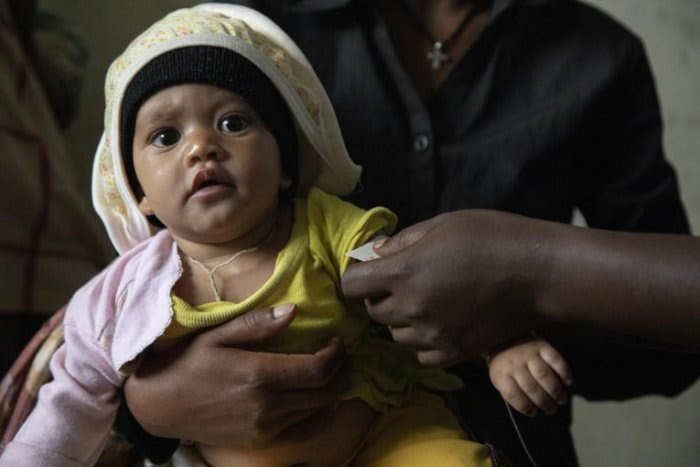Ethiopia Having More Children With Acute Malnutrition – UNICEF
UNICEF has said that the food security crisis and malnutrition in Ethiopia’s Tigray and the neighbouring regions is being driven by armed conflict, and it can only be resolved by the parties to the conflict and humanitarian community.

The United Nations Children’s Emergency Fund (UNICEF) said more than 100,000 children in Tigray, Ethiopia, could suffer from life-threatening severe acute malnutrition (SAM) in the next 12 months, a ten-fold increase to normal numbers.
The malnutrition estimates for children were based on an analysis of data from weekly Mid-Upper Arm Circumference (MUAC) screenings conducted by UNICEF and partners since the outbreak of conflict in the region nearly nine months ago.
The data, collected from more than 435,000 children, provides an estimation of 2.3 per cent severe and 15.6 per cent moderate acute malnutrition, which exceeds the emergency action of 15 per cent.
Marixie Mercado, UNICEF’s spokesperson, said 47 per cent of all pregnant and breastfeeding women were acutely malnourished in Tigray where fighting between rebels and government security forces had raged on since Nov., 2020.
“These rates suggest that mothers could face more pregnancy-related complications, increasing the risks of maternal death during childbirth as well as the delivery of low birth weight babies who are prone to sickness and death,” Mercado said in a statement on Friday, July 30.
The malnutrition crisis, she said, was taking place amidst food shortage, poor sanitary and healthcare systems in the war-ravaged region.
For months, humanitarian aid, including UNICEF initiative, was blocked in the region.
“Last week I was able to join nutrition screenings in Wajirat and Gijet woredas, two districts that had been inaccessible throughout the conflict,” Mercado said.
“What I saw was a confluence of conditions that put children’s lives at risk: in many places, there were no supplies of the therapeutic foods needed to treat severe acute malnutrition. There were no antibiotics. Health facilities had no electricity. Plus, children have not been vaccinated for months.”
She explained that the recent uptick of fighting in neighbouring Afar and Amhara regions, where nearly 1.5 million people were already facing acute food insecurity, further spread across all of northern Ethiopia.
According to the UN, around 400,000 people are faced with famine in Tigray, and more than 90 per cent of the population needs emergency food aid.
The Ethiopian government blamed Tigray regional forces for blocking aid and said it had stockpiled reserve wheat in the region but did not provide details on the stockpile’s location or plans for distribution, according to Reuters.
UNICEF’s spokesperson said that the risk of disease outbreaks was high, particularly in the overcrowded and unsanitary sites hosting displaced families.
“Food stores have been looted. Without sufficient humanitarian assistance, child malnutrition is rising beyond alarming levels, leading to an increased risk of mortality among a vulnerable population,” she said.
According to her, UNICEF had begun dispatching supplies to meet new emergency needs in Afar and Amhara.
“We need access into Tigray and across the region, in order to provide support children and women urgently need. Right now, we have just 6,900 cartons of life saving ready-to-eat therapeutic foods in our warehouses in Tigray. That is enough to treat severe malnutrition in just 6,900 children,” she disclosed.
She called on humanitarian communities for supplies of ready-to-eat therapeutic foods needed to treat severe acute malnutrition.
Support Our Journalism
There are millions of ordinary people affected by conflict in Africa whose stories are missing in the mainstream media. HumAngle is determined to tell those challenging and under-reported stories, hoping that the people impacted by these conflicts will find the safety and security they deserve.
To ensure that we continue to provide public service coverage, we have a small favour to ask you. We want you to be part of our journalistic endeavour by contributing a token to us.
Your donation will further promote a robust, free, and independent media.
Donate HereStay Closer To The Stories That Matter




